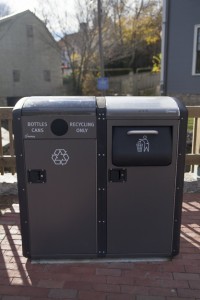
HYANNIS – Barnstable County is considering multiple paths for how to best handle the region’s solid waste issue, one that has grown over the course of the COVID-19 pandemic.
Amid towns seeing disposal contract prices increasing, rising transportation costs and an inconsistent market for recyclables, county officials and local experts outlined two studies by Geosyntec Consultants and Tetra Tech.
They evaluated out-of-state disposal costs and benefits as well as diversion options for recyclables.
Commission Legal and Policy Specialist Patty Daley said that organics—primarily food and yard waste—make up about 30 percent of all waste and is also some of the denser and heavier waste forms to transport.
She added that waste-by-rail is the most efficient choice moving forward, even though there are no large-scale waste handling facilities in the New England region.
“Not only did Geosyntec find that waste-by-rail is the optimal long-term solution, but there’s been a change in the dynamic of how those are contracted now. Under the new dynamic, the disposal facility actually manages the contracts with CSX Transportation and the rail provider. So it’s a single contract that makes it much easier to manage,” said Daley.
“Over 10 years ago, the Cape towns would have had to purchase rail cars, and that made it prohibitively expensive. That’s not the case now.”
Compared to the existing system which produces about 5,600 metric tons of greenhouse emissions per year, out-of-state by rail would cut that down to about 3,800 metric tons per year.
“That is primarily because the out-of-state disposal landfills have methane capture and waste-to-energy capabilities that would lower those emissions,” said Daley.
She added that if the region were to do organics processing, taking food wastes out of the waste stream and composting them locally, then greenhouse gas emissions would further drop by approximately three fold.
Fifteen-year projected cost savings would range between $15.6 and $34 million by utilizing rail, depending on independent variables outside county control, such as inflation.
The cost avoidance would be between $20 and $26 million if local composting is factored in.
Cape Cod Cooperative Extension’s Waste Regional Waste Reduction Coordinator Kari Parcell, speaking on behalf of Tetra Tech’s study, said that Joint Base Cape Cod may provide an opportunity to set aside large potential development areas for larger scale solid waste infrastructure.
She added that the idea has not yet been brought to any Joint Base officials, and was only factored as a possibility by the study, not a definitive plan.
She said that existing processing infrastructure has little room left to grow as available land is scarce and must avoid proximity to developments and sensitive environmental locations.
Officials said that they would reach out to towns and review potential opportunities for county assistance.























